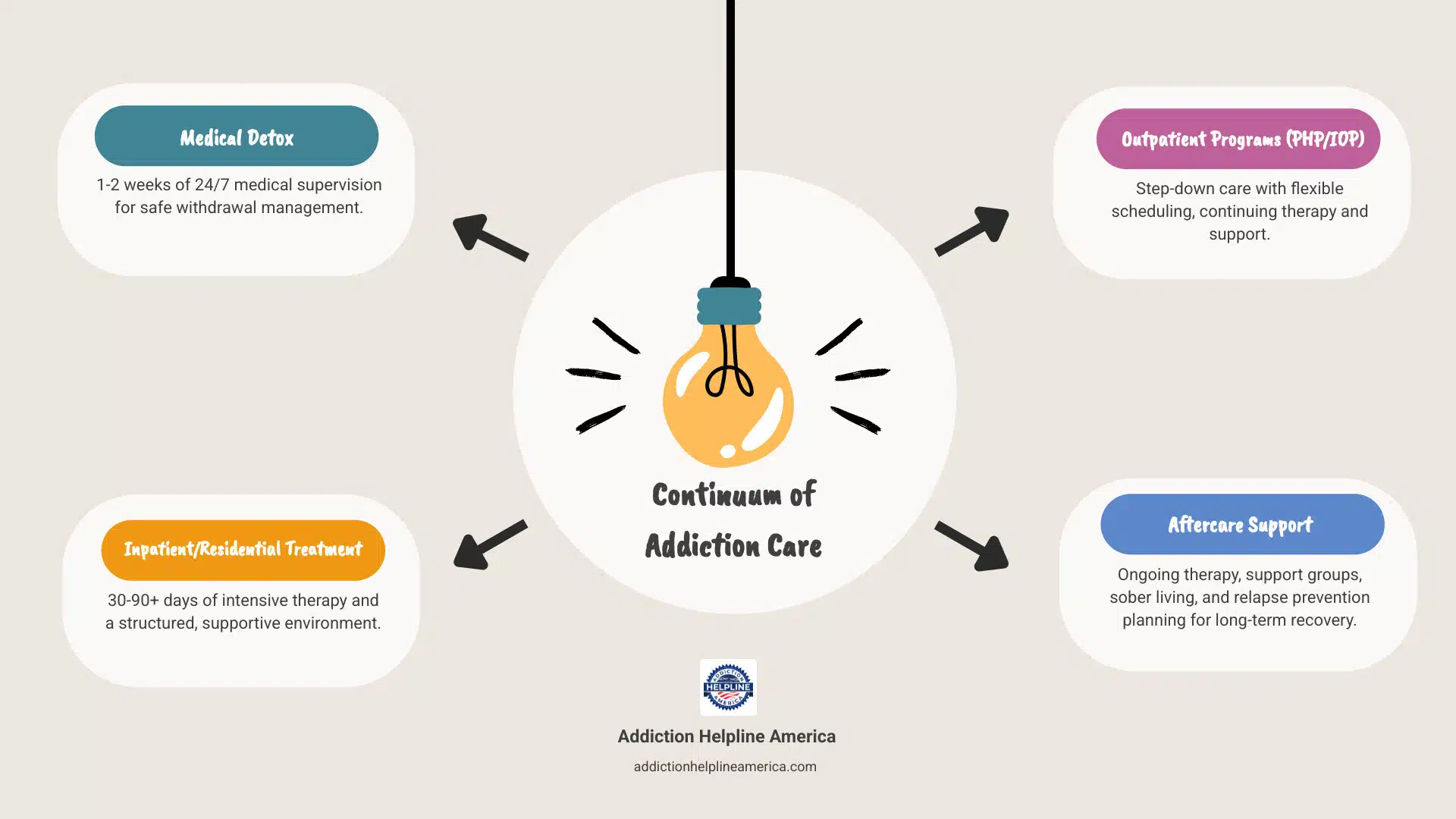Limited Availability: Treatment beds filling quickly. Call now for immediate placement – (844) 561-0606
Inpatient Drug Rehab Centers provide 24/7 residential care for individuals with substance use disorders, offering a safe, structured environment for recovery. The best centers are defined by comprehensive, evidence-based therapies, dual diagnosis treatment, 24/7 medical supervision, proper accreditation, personalized treatment plans, robust aftercare, and a supportive environment.
In 2021, 46.3 million Americans aged 12 or older had a substance use disorder. If you or a loved one is among them, you are not alone. Choosing the right inpatient drug rehab center is a critical decision, but it can feel overwhelming.
Not all rehab centers are created equal. Some offer proven, personalized care, while others lack proper accreditation or fail to address co-occurring mental health issues. This guide cuts through the confusion by identifying the 7 key hallmarks of an exceptional inpatient drug rehab center. You’ll learn what to look for and what questions to ask before making this choice.
At Addiction Helpline America, we help individuals and families steer the complex landscape of Inpatient Drug Rehab Centers. Our goal is to provide the clarity you need to take the first step toward recovery.

An Inpatient Drug Rehab Center is a residential program where you live at the facility full-time while receiving 24/7 care, structured daily schedules, and constant support from medical professionals. It is the most intensive level of care for substance use disorders.
Inpatient treatment allows you to step away from daily triggers and stressors into a safe, healing environment where recovery is the sole focus. You are surrounded by medical staff who monitor your health, therapists who guide you through the emotional work, and peers who understand your journey. The entire program, from daily schedules to meals, is designed to help you build a foundation for lasting sobriety.
Many programs begin with medical detox to safely manage withdrawal symptoms, which can be uncomfortable or even dangerous. Medical professionals monitor your health and may offer medications to ease cravings and discomfort. Once stabilized, you transition into the residential phase, which includes individual therapy, group counseling, and family therapy. You’ll learn coping skills, address the root causes of addiction, and begin to rebuild your life.
| Feature | Medical Detox | Inpatient Rehab | Outpatient Rehab |
|---|---|---|---|
| Environment | Hospital-like setting, 24/7 medical care | Residential facility, 24/7 structured care | Regular visits to offsite center |
| Duration | Typically 1-2 weeks | Typically 30-90+ days | Varies, 10-30 hours/week |
| Supervision | Constant medical monitoring | Constant supervision and support | Scheduled appointments, live at home |
| Cost (CA Avg) | $139,673 | $49,994 | $8,307 |
| Ideal For | Severe withdrawal risk, medical complications | Severe addiction, unstable home, dual diagnosis | Less severe addiction, step-down care |
Inpatient Drug Rehab Centers are especially beneficial for certain situations. This level of care is often life-saving for those with severe addiction, a history of relapse, or those who have tried to quit multiple times without success. It provides the intensive, focused support needed to break the cycle.
If your home environment is unstable or unsupportive of recovery, inpatient treatment removes you from those triggers, giving you the space to heal. It is also critical for individuals with co-occurring disorders, such as depression, anxiety, or PTSD. About half of people with substance use disorders also have a mental health condition. A dual diagnosis inpatient center treats both conditions simultaneously, which is essential for long-term recovery.
Choosing the right level of care is a personal decision. At Addiction Helpline America, we help people assess their needs and find the right fit. If you’re unsure if inpatient rehab is right for you, we’re here to provide honest guidance.

Not all Inpatient Drug Rehab Centers are created equal. The difference between a life-changing program and a disappointing one often comes down to seven essential qualities. Use this as a checklist to ask the right questions and find a center that truly delivers on its promises.
Exceptional centers offer a full toolkit of proven therapies to address the complex nature of addiction. This includes:
Top programs also use specific evidence-based approaches like Cognitive Behavioral Therapy (CBT) to change negative thought patterns and Dialectical Behavior Therapy (DBT) to regulate emotions and prevent relapse. Many also incorporate Motivational Interviewing and 12-step programs.
Beyond traditional methods, many centers offer holistic therapies like yoga, meditation, art therapy, and music therapy. These practices address the whole person—mind, body, and spirit—to provide a rich mix of tools for lasting sobriety.
About half of people with a substance use disorder also have a mental health condition like depression, anxiety, or PTSD. The best Inpatient Drug Rehab Centers understand this connection and offer integrated care that addresses both issues simultaneously. This means having psychiatrists, therapists, and addiction specialists collaborate on a unified treatment plan. Treating addiction while ignoring underlying mental health issues is a recipe for relapse; integrated care is crucial for lasting recovery.

Patient safety is paramount, especially during detox. Withdrawal from substances like alcohol or benzodiazepines can be dangerous. The best centers provide 24/7 medical support with doctors and nurses to manage withdrawal symptoms and ensure physical safety. Many offer medication-assisted treatment (MAT), using FDA-approved medications to reduce cravings and ease withdrawal, which is highly effective for opioid and alcohol addiction.
Beyond medical care, a structured daily schedule provides a framework for recovery. A typical day includes therapy, group meetings, educational workshops, and recreational activities. This routine eliminates chaos and allows you to focus your energy on healing. Quality facilities also provide nutritional support with healthy meals and recreational therapy (e.g., sports, hiking, art) to help you rebuild a healthy lifestyle.

Take the first step towards a healthier life! Call now to connect with our compassionate team and start your recovery journey today. Your path to healing awaits!
Our recovery specialists are available 24/7 to provide support, and all calls are confidential and free. Reach out anytime – we’re here to help!
Accreditation and licensing are your assurance that a facility meets rigorous standards for patient care, safety, and ethics. Look for accreditation from organizations like The Joint Commission or CARF (Commission on Accreditation of Rehabilitation Facilities). These credentials indicate that a center has undergone thorough evaluation and operates at a high standard.
State licensing confirms a facility meets minimum safety requirements and operates legally. Membership in organizations like NAATP (National Association of Addiction Treatment Providers) also shows a commitment to best practices. Reputable centers will be transparent about their credentials and staff qualifications. This is your safety net, ensuring you’re working with professionals who follow established standards.
Your addiction story is unique, and your treatment should be too. The best Inpatient Drug Rehab Centers reject one-size-fits-all approaches. They begin with a comprehensive individualized assessment of your medical health, mental health, and substance use history. This forms the basis of a custom treatment plan custom to you.
Progress is often based on clinical milestones rather than a rigid timeframe, ensuring you get the support you need for as long as you need it. Look for centers with expertise in treating your specific substance use disorder and those offering specialized tracks for populations like veterans, LGBTQ+ individuals, or professionals, which can provide a more culturally competent and effective care environment.
Completing an inpatient program is the beginning of a lifelong journey. The best centers prepare you for this with a comprehensive aftercare plan that begins on day one. This continuum of care is essential for preventing relapse.
Your discharge plan should be detailed, addressing where you will live and what support you will have. This may include a transition to a sober living home. Many centers offer alumni programs to keep you connected to a recovery community and provide ongoing support. Your plan should also include referrals to support groups (like AA, NA, or SMART Recovery) and step-down programs like Partial Hospitalization (PHP) or Intensive Outpatient (IOP) care. The goal is to reinforce the coping skills learned in rehab and apply them to real-world situations.
The environment of a rehab center plays a significant role in healing. The best Inpatient Drug Rehab Centers cultivate a physical and emotional atmosphere that feels safe, comfortable, and conducive to recovery.
Facility amenities can improve the experience, whether it’s a private room for reflection or a shared room to foster connection. Fitness centers, pools, and tranquil outdoor spaces are not just luxuries; they are tools for healing. The location can also be influential, with serene, natural settings providing a peaceful backdrop for introspection.
A strong sense of community and peer support is vital, as healing happens in connection with others. A low staff-to-patient ratio often means more personalized attention. Finally, reading reviews and testimonials from former patients can offer insight into a facility’s atmosphere and overall effectiveness.

Considering Inpatient Drug Rehab Centers brings up practical questions about cost, duration, and how to find the right program. Let’s clarify these important steps.
The cost of inpatient rehab varies widely based on location, amenities, program length, and specialized services. For example, the average cost in California is around $49,994. However, you have options, and many people do not pay the full sticker price.
Don’t let cost be a barrier. An admissions team can help you explore financial options. We at Addiction Helpline America can also help you find a program that fits your budget.
The most common program lengths are 30, 60, or 90 days. While 30-day programs are common, the National Institute on Drug Abuse (NIDA) recommends at least 90 days in treatment for the most effective outcomes. The brain needs time to heal and for new, healthy habits to become ingrained.
Longer treatment is consistently associated with better long-term sobriety rates. Some individuals with severe addiction or complex co-occurring disorders may benefit from even longer stays in therapeutic communities, which can last six months or more. The best programs base your length of stay on clinical milestones, ensuring you transition to the next level of care only when you are ready.
Finding the right Inpatient Drug Rehab Center can feel like searching for a needle in a haystack, but you don’t have to do it alone. The most effective first step is to get expert guidance. You can also explore government resources like SAMHSA’s FindTreatment.gov to see licensed programs in your area.
Our team at Addiction Helpline America specializes in this process. We can help you:
When evaluating a center, you should ask about:
Instead of navigating this complex process by yourself, let us help. Our service is free, confidential, and designed to connect you with a quality program that fits your unique situation.
It’s normal to have questions when considering inpatient rehab. Here are answers to some of the most common ones we hear at Addiction Helpline America.
Inpatient Drug Rehab Centers are highly structured to keep you focused on recovery. While schedules vary, a typical day includes:
This routine replaces the chaos of addiction with stability and purpose, creating a comforting and predictable environment for healing.

Take the first step towards a healthier life! Call now to connect with our compassionate team and start your recovery journey today. Your path to healing awaits!
Our recovery specialists are available 24/7 to provide support, and all calls are confidential and free. Reach out anytime – we’re here to help!
Policies on electronic devices vary significantly between facilities. Many centers enforce a “blackout phase” for the first week or so, with no access to phones or laptops. This allows you to disconnect from outside stressors and fully immerse yourself in treatment. After this initial period, some facilities allow limited, supervised access during designated times to contact supportive family members.
Other centers are more cell phone-friendly, recognizing that staying connected to a positive support system can be beneficial. Always ask about a facility’s specific policy during the admissions process to know what to expect.
Pack for comfort and simplicity. Most centers provide a specific list, but here are some general guidelines:
Our team at Addiction Helpline America can help you prepare and understand what to expect before you go.
Researching Inpatient Drug Rehab Centers is a courageous first step toward change. We’ve covered the seven hallmarks of an effective program: comprehensive therapies, dual diagnosis care, medical supervision, accreditation, personalized plans, aftercare, and a healing atmosphere.
The “best” rehab is the one that fits your unique needs, challenges, and goals. Whether you need trauma-informed care, dual diagnosis treatment, or simply a safe space away from triggers, the right program is out there.
Recovery is possible. With the right support, people rebuild their lives every day. You can be one of them.
At Addiction Helpline America, we specialize in navigating this process. We offer free, confidential, and personalized guidance to connect you with trusted Inpatient Drug Rehab Centers from our nationwide network. We listen to your story and help you find your program.
You don’t have to do this alone. Let us help you take the next step.
Are you or a loved one struggling with addiction? Call today to speak to a treatment expert.
For anyone seeking help for addiction for themselves or a loved one calls to Addiction Helpline America are completely confidential and available 24/7.
Please note: any treatment center listed on our site that receives calls is a paid advertiser.
Calls to a specific treatment center’s listing will be connected directly to that center.
Calls to our general helpline will be answered by treatment providers, all of whom are paid advertisers.
By calling the helpline, you agree to our terms and conditions. These calls are free of charge and carry no obligation to enter treatment. Neither Sober Steps nor anyone answering your call receives a commission or fee based on your choice of treatment provider.
If you’d like to explore additional treatment options or connect with a specific rehab center, you can browse our top-rated listings, visit our homepage, or call us at (844) 561-0606. You may also contact us for further assistance.
Calls to any general helpline will be answered or returned by one of the treatment providers listed, each of which is a paid advertiser:
Our helpline is available 24 hours a day, 7 days a week at no cost to you and with no obligation for you to enter into treatment. We are committed to providing support and guidance whenever you need it.
In some cases, Addiction Helpline America charges our verified partner a modest cost per call. This fee helps us cover the costs of building and maintaining our website, ensuring that we can continue to offer this valuable service to those in need.